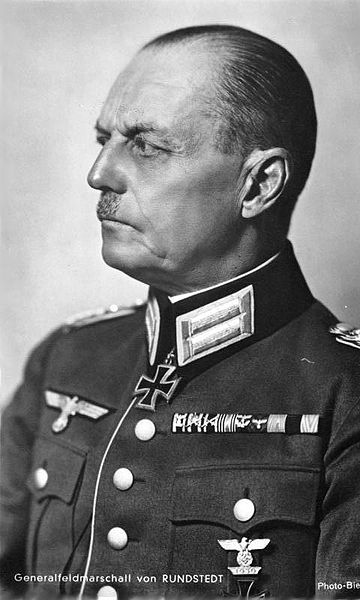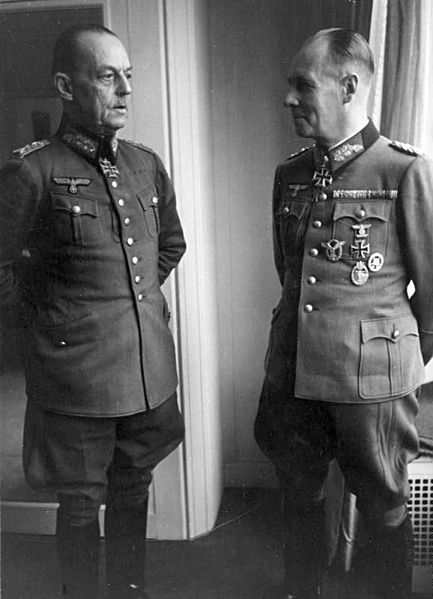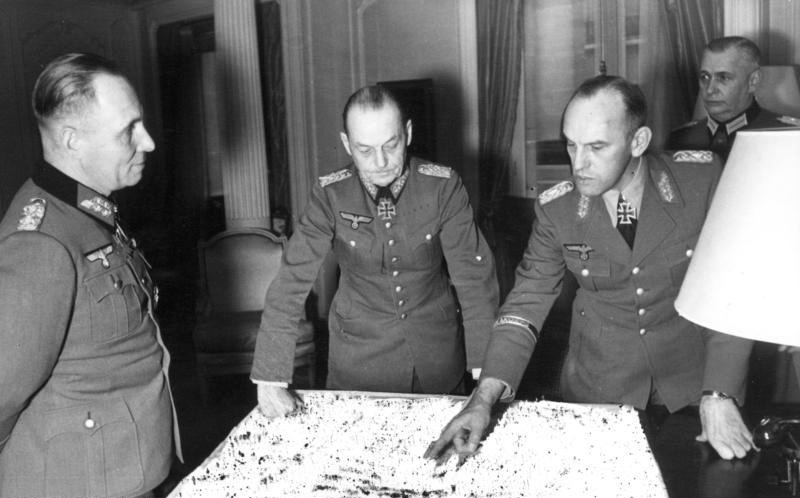<Back to Index>
- Businessman Henry Wells, 1805
- Architect Bruce Price, 1845
- General Field Marshal of the German Army Karl Rudolf Gerd von Rundstedt, 1875
PAGE SPONSOR



Karl Rudolf Gerd von Rundstedt (December 12, 1875 - February 24, 1953) was a Generalfeldmarschall of the German Army during World War II. He held some of the highest field commands in all phases of the war.
Born into an aristocratic Prussian family, he entered the Reichswehr and
rose steadily through the ranks in World War I. In the Interwar years
he continued his career, but ultimately retired. Nevertheless at the
beginning of the Second World War he returned as Commander of the Army Group South in the Poland campaign. He maintained command of large formations during Fall Gelb and
was promoted to the rank of a field marshall on July 19, 1940. In the
Russian Campaign he commanded Army Group South, responsible for the
successful encirclement of large Soviet forces in the Battle of Kiev. Due to the failure of Operation Barbarossa, he was, like many commanders, dropped by Hitler, but was recalled in 1942 as OB West.
He retained this command (with several interruptions) until his
dismissal by Hitler in March 1945, before he was captured by the Allies. He
was charged with war crimes, but never faced any trial due to his poor
health. He was released from captivity in 1948 and died in Hanover in
1953. Born in Aschersleben in the Province of Saxony into an aristocratic Prussian family, von Rundstedt joined the German Army in 1892, then entered Germany's elite military academy in 1902 – an institution that accepted only 160 new students annually and weeded out 75% of the students through exams. During World War Ihe rose in rank until 1918 when he was a major and was chief of staff of his division. After the war, von Rundstedt rose steadily in the small 100,000 man army (the Reichswehr) and in 1932, was appointed commander of the 3rd Infantry Division. On July 20, 1932, Rundstedt carried out the so-called Rape of Prussia that saw the Reichswehr oust the Social Democratic government of Prussia and allowed the Chancellor Franz von Papen to become the Reich Commissioner of Prussia. Later that year he threatened to resign when Franz von Papen declared martial law and ordered his troops to eject members of the Nazi Party from state government offices. In 1938 he was appointed commander of the 2nd Army that occupied the Sudetenland, but he retired after it was understood that Werner von Fritsch - Commander - in - Chief of the Army (OKH) - was framed by the Gestapo in the Blomberg - Fritsch Affair.
Upon his retirement he was given the honorary appointment of
Colonel - in - Chief of the 18th Infantry regiment; thereafter, von
Rundstedt frequently wore an infantry colonel's uniform and collar
patches, with his Field Marshal's shoulder insignia, until the end of
his career. On occasion, he was mistaken for a colonel, but he simply
laughed at the notion. In September 1939 World War II began, and von Rundstedt was recalled to active service to lead Army Group South during the successful invasion of Poland. Turning to the West, he supported Manstein's "armoured fist" approach to the invasion of France, and this was eventually selected as Fall Gelb. During the battle he was placed in command of seven panzer divisions, three motorized infantry divisions, and 35 regular infantry divisions. By May 14, 1940, the armoured divisions led by Heinz Guderian had crossed the Meuse and
had opened up a huge gap in the Allied front. General von Rundstedt had
doubts about the survivability of these units without infantry support,
and asked for a pause while the infantry caught up; the halt allowed
the British to evacuate their forces to Dunkirk.
Later Rundstedt forbade an attack on the Dunkirk beachhead, allowing
the British to fully evacuate it. This turn of events has raised
eyebrows over the years. Von Rundstedt and others subsequently argued
that the decision was Hitler's and stemmed from his belief that Britain
would more readily accept a peace treaty if he magnanimously spared
what remained of her expeditionary force. However, this was no more
than a face-saving rationalization. Rundstedt had wanted to preserve
his motorized units for the final push to the south to conclude the campaign against the French while Göring had convinced Hitler the Luftwaffe could finish the job. Von Rundstedt was promoted to field marshal on July 19, 1940 and took part in the planning of Operation Sea Lion.
When the invasion was called off, von Rundstedt took control of
occupation forces and was given responsibility to develop the coastal
defenses in the Netherlands, Belgium and France. In June 1941, von Rundstedt took part in Operation Barbarossa as commander of Army Group South, where he led 52 infantry divisions and five Panzer divisions into the Soviet Union. At first his progress was slow, but in September AG South captured Kiev in
a double encirclement operation made possible by Stalin's unreasoning
refusal to abandon the city, although the Dnieper had been crossed both
north and south of it. The Germans claimed a fantastic haul of 665,000
Russian prisoners based on the encircled divisions' nominal, pre-combat
strength as revealed by captured Soviet records. The Soviets reported
that owing to previous losses - also exaggerated by the Germans, yet not
subtracted by them from their tally of Soviet prisoners - the encircled
divisions possessed merely 452,000 men and that, of those, 150,541
escaped the pocket before the German infantry divisions caught up with
the armour and the ring of encirclement was consolidated. Thus,
according to the Soviets, "only" 300,000 men were permanently trapped,
whether captured or killed. After this, von Rundstedt moved east to
attack Kharkov and Rostov.
He strongly opposed continuing the advance into the Soviet Union during
the winter and advised Hitler to halt the offensive, but his views were
rejected. In November, 1941 von Rundstedt had a heart attack,
but he refused to be hospitalized and continued the advance, reaching
Rostov on November 21. A counter - attack forced the Germans back. When
von Rundstedt demanded to be allowed to withdraw, Hitler became furious
and replaced him with General Walther von Reichenau.
Hitler recalled von Rundstedt to duty in March 1942, placing him once again in command of the west. There he proved complacent, so much so that as late as the autumn of 1943, nofortifications worthy of mention existed along the entire Atlantic shore. It was only after Field Marshal Erwin Rommel's
appointment as von Rundstedt's ostensible subordinate in November 1943
that fortification work began in earnest. During the debates preceding
the landing, von Rundstedt insisted that the armoured reserves should
be held in the operational rear so that they could all be rushed to
whatever sector the Allies happened to land in. General Geyr von Schweppenburg, the armoured commander, supported him, but Rommel insisted that the
armoured forces must be deployed very near the shoreline, just beyond
the reach of the Allied naval bombardment. Badly affected by his
experiences in Africa, Rommel believed that Allied air operations would
prohibit movement during the day and even at night gravely inhibit
movement. But von Rundstedt was convinced that a landing as far west as Normandy was
out of the question and that very little armour should be committed
there. Ultimately, the armoured divisions were dispersed and only two
were spared to the Channel coast west of the Seine with one assigned to
the Normandy sector, a deployment that would have disastrous
consequences once the invasion began. After the D-Day landings in
June 1944, von Rundstedt urged Hitler to negotiate a settlement with
the Allies, his frustration culminating in his outburst, "Make peace,
you idiots!" Hitler responded by replacing him with Field Marshal Günther von Kluge. As a result of the July 20 Plot, which enraged von Rundstedt, he agreed to join OKW chief Field Marshal Wilhelm Keitel and Guderian on the Army Court of Honour that
expelled hundreds of officers suspected of being opposed to Hitler,
often on the flimsiest of evidence. This judgement removed the
suspected dissidents from the jurisdiction of the military and turned them over to the Volksgerichtshof and its presiding judge, Roland Freisler. Many of these men were executed after brief trials in what amounted to a kangaroo court. In mid August 1944, von Kluge committed suicide after being implicated in the July 20 Plot and Field Marshal Walter Model was
given command of OB West; Model held the post for eighteen days before
von Rundstedt was reappointed to command Germany's forces in the west.
He rallied them in time to fight off Operation Market Garden, with Model's Army Group B at
the center of the German defense. Although von Rundstedt was in command
of the German forces on the Western front throughout Operation Wacht am Rhein (the Battle of the Bulge,
also known as the Runstedt Offensive), he was opposed to that offensive
from its inception, and essentially washed his hands of it. He was
relieved of command for the last time in March 1945, after telling
Keitel once again that Hitler should make peace with the Allies, rather
than continue to fight a hopeless war. Rundstedt was captured by the US 36th Infantry Division on
May 1, 1945. During his captivity, he was reportedly asked by Soviet
interrogators which battle he regarded as most decisive. They expected
him to say "Stalingrad", but von Rundstedt replied "The Battle of Britain". Annoyed, the Soviets "put away their notebooks and left." While
being interrogated, he suffered another heart attack, and was taken to
Britain, where he was held in a prisoner - of - war camp in Bridgend, South
Wales, and at Redgrave, Suffolk. The
British authorities charged him with war crimes. The following are the
details of the cases against von Rundstedt and three other members of
the German General Staff. A secret British cabinet report of 17 June
1948 states: "... the Nuremberg Judgment relating to the German General
Staff which ends — " Where the facts warrant it, these men should be
brought to trial so that those among them who are guilty of these
crimes should not escape punishment". 3. The memorandum, which is voluminous, discloses a prima facie case for various crimes, in particular the following:— (a)
Against all four generals, in connection with the " Commissar " Order,
under which political commissars of the Russian Army were not to be
recognized as prisoners of war and were to be liquidated. (b)
Against RUNDSTEDT, in connection with the " Commando " Order, under
which parachutists who were taken prisoner not in connection with
battle actions were to be transferred to the Gestapo by whom they were,
in fact, killed. (c) Against all four generals, for responsibility for murder and ill treatment of allied prisoners of war, chiefly Russians. (d)
Against BRAUCHITSCH, RUNDSTEDT and MANSTEIN, for certain breaches of
the Geneva Convention arising out of the use of prisoners of war,
chiefly Russians, on prohibited and dangerous work. (e)
Against all four generals, for responsibility for many crimes against
civilians, including the illegal execution of hostages, excessive
reprisals, extermination of Slavs, Jews and Communists and deportation
into slave labour of civilians from all the occupied territories. 4.
The vast majority of the victims were Russians. In point of numbers the
Poles, doubtless, come second and Belgian, French, British and American
victims were also involved, but in much smaller numbers. Our own direct
interest is limited to the responsibility of RUNDSTEDT for the passing
on of the " Commando" Order in so far as our own Special Air Service
troops were killed, pursuant to it. Many of the actual perpetrators of
these killings have already been tried before British Military Courts.
The memorandum indicated evidence that RUNDSTEDT published a "
Commando" Order dated 21 July 1942 which, therefore, preceded Hitler's
" Commando " Order of 18 October 1942..." [British National Archives:CAB/129/28] On October 10, 1941, his subordinate, Walther von Reichenau, the 6th Army's commander, had issued his infamous "Reichenau Order". Upon hearing of Reichenau's Severity Order,
Rundstedt expressed his "complete agreement" with it, and sent out a
circular to all of the Army generals under his command urging them to
send out their own versions of the Severity Order, which would impress upon the troops the need to exterminate Jews. Ultimately,
he never faced trial, citing poor health reasons. A joint Board of two
experienced medical officers of the prison service and two British Army
doctors examined him and reported von Rundstedt's condition: "...We are
of opinion that he is unfit to stand his trial as a result of
enfeeblement of mental function due to senile changes and congestive
heart failure." [British National Archives:CAB/129/34] Some doubts were
expressed if he really was sick enough, however the British cabinet
decided that the court should decide whether he was fit to stand trial
or not. They had reservations about prosecuting him due to his age,
they were concerned that it would be seen as vengeance not justice
amongst other concerns. A British cabinet report of 17 June 1948
records the following, "...and uncertainty whether essential evidence
will be forthcoming, particularly from our eastern war
time Allies, the possibility that RUNSTEDT or STRAUSS may collapse or
commit suicide before or during their trials, the ages of the three
generals and unlikelihood that the death sentence will be inflicted if
passed and the fact that they can still be detained in custody or kept
under control if a danger to security. It may be mentioned that we have
already tried eleven German generals before British Military Courts.
Four were sentenced to death, but none, in fact, executed..."[British
National Archives:CAB/129/28]. Von Rundstedt was 73. He was released in July 1948. After his liberation, he took residence in Schloss Oppershausen near Celle. Suffering from heart problems, Gerd von Rundstedt died in Hanover on 24 February 1953, at the age of 77.
On
January 22, 1902 von Rundstedt married Luise Bila von Götz (d.
1952) and they had one child, Hans Gerd von Rundstedt (1903 – 1948).
